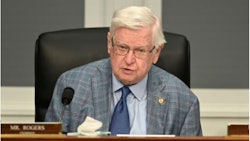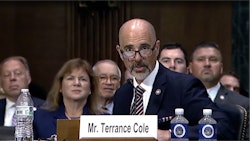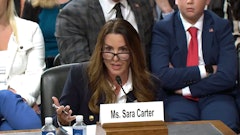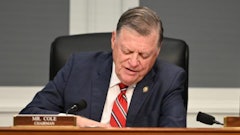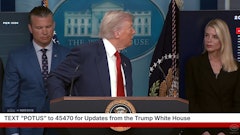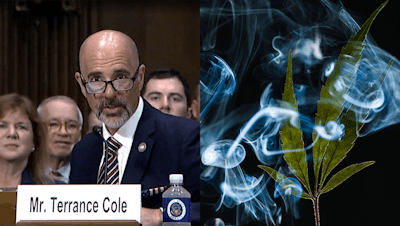
UPDATE: The U.S. Senate voted, 50-47, on July 22 to confirm President Donald Trump’s nomination of Terrance Cole to be the Drug Enforcement Administration (DEA) Administrator. This vote came after the Senate voted, 44-43, on July 21 on a motion to invoke cloture and end debate on the nomination.
President Donald Trump’s nomination to head the Drug Enforcement Administration (DEA) could be confirmed as soon as next week after the U.S. Senate scheduled a July 21 vote on a motion to invoke cloture.
Should the cloture motion succeed, then Terrance Cole, a 22-year DEA veteran who currently serves as the secretary of Virginia’s Public Safety and Homeland Security, could be confirmed the next day.
Senate Majority Leader John Thune, R-S.D., filed the cloture motion on July 17, ordering the 5:30 p.m. vote for July 21 on the executive calendar.
The motion comes more than five months after Trump announced Cole as his choice for DEA administrator in February after removing his original pick, Florida Sheriff Chad Chronister, from consideration in early December because the president “did not like what he said to my pastors and other supporters.”
Cole’s selection was met with mixed reviews by cannabis industry stakeholders amid an administrative law judge (ALJ) hearing to consider a cannabis rescheduling proposal that’s been delayed by an interlocutory appeal since Jan. 13.
Specifically, pro-rescheduling advocates offered concerns with Cole’s stance on cannabis based on LinkedIn comments he made last year during a “surprise visit” to the Virginia Cannabis Control Authority, when he said, “Everybody knows my stance on marijuana after 30-plus years in law enforcement, so don’t even ask.”
Furthermore, Cole included the hashtag “just say no,” an indication to some that his policies align with the late former first lady Nancy Reagan’s campaign that took off during the 1980s as part of the country’s drug war.
Cole also promoted an article in 2024 that suggested cannabis is “four times more dangerous” than it was three decades ago, and he shared another article claiming there’s a connection between cannabis and higher suicide rates among youth.
“Concerned about our youth?” Cole wrote. “Recent study shows higher suicide risks linked to marijuana and alcohol use in high school.”
Because the Department of Justice’s (DOJ) proposed rule to reclassify cannabis from Schedule I to Schedule III under the Controlled Substances Act (CSA) was signed by former Attorney General Merrick Garland under President Joe Biden, the Trump White House could kill the proposed rule altogether, sending the process back to square one.
Specifically, the proposal came after Biden’s Department of Health and Human Services (HHS) conducted a medical and scientific analysis, finding that cannabis has currently accepted medical use in the U.S. and recommending in August 2023, under former Secretary Xavier Becerra, that it should be relisted as a Schedule III drug.
If he wanted, Trump could order his HHS, under Robert F. Kennedy Jr., to conduct a new review of how cannabis is scheduled.
However, Trump signaled along the campaign trail in September 2024 that he backed the Biden administration’s push to reclassify cannabis. “As President, we will continue to focus on research to unlock the medical uses of marijuana to a Schedule 3 drug, and work with Congress to pass common sense laws,” Trump wrote on Truth Social.
Furthermore, Cole indicated during a Senate Judiciary Committee confirmation hearing in April that he intends to move the current cannabis rescheduling process forward. “I’m not familiar exactly where we are, but I know the process has been delayed numerous times, and it’s time to move forward,” Cole told Sen. Alex Padilla, D-Calif., during the hearing.
Although that was a positive sign for those wanting the hearing process to debate the merits of the Schedule III proposal to play out in public, Cole declined to commit to seeing the proposed rule through to “fruition.”
“I need to understand more where they are and look at the science behind it and listen to the experts and really understand where they are in the process,” Cole said.
In May, when responding to written questions for the record from the committee members, Cole said more of the same: “If confirmed, I will give the matter careful consideration after consulting with appropriate personnel within the Drug Enforcement Administration, familiarizing myself with the current status of the regulatory process, and reviewing all relevant information.”
This context perhaps provides more evidence for certain pro-rescheduling designated participants in the ALJ hearing, who have argued that the DEA stacked the deck and colluded with anti-rescheduling participants, and therefore should not be allowed to participate in the hearing, especially in the capacity as the “proponent” of a rule it did not propose. Garland broke precedent in May 2024, when he signed the notice of proposal rulemaking, a document historically signed by the DEA administrator.
However, that argument leans on claims that the DEA participated in ex parte communications under former Administrator Anne Milgram, who resigned when Trump took office.
The evidence of possible improper communications was magnified when the Doctors for Drug Policy Reform (D4DPR), a nonprofit organization of medical professionals in support of evidence-based cannabis regulation, filed a lawsuit in February that uncovered the DEA’s “cure letters” sent to several anti-rescheduling entities hoping to participate in the hearing process. The letters provided them the opportunity to submit supplemental information showing that they met the “interested person” status under the Administrative Procedure Act.
In granting pro-rescheduling advocates an interlocutory appeal in January, the DEA’s chief ALJ, John J. Mulrooney, scolded the agency.
“The government’s failure to acknowledge in any way the gravity of the highest levels of its organization allegedly reaching out to help one of the potential DPs fortify its application to ease the task of justifying its apparently pre-made determination for appeal demonstrates an arrogant overconfidence that may not serve it well in the future,” the judge wrote.
In granting the rare appeal before the hearing process even plays out, Mulrooney ordered the DEA and the interlocutory appellants, now fully represented by Blank Rome LLP Partner Shane Pennington, to provide him with a joint status update every 90 days. The judge also ordered the DEA administrator’s office to fix a briefing schedule to allow the hearing’s designated participants to file briefs with the administrator concerning the appeal.
However, without Cole’s confirmation, the DEA has stalled on setting a briefing schedule under acting administrators Derek S. Maltz and Robert Murphy, preventing the hearing process from moving forward.
Upon confirmation, Cole would need to configure the briefing schedule and “entertain oral arguments” if he “desires” from the hearing’s designated participants to get the process up and running again. Cole would need to issue a binding, written decision to Mulrooney on whether the hearing process should resume.
Still, even if the hearing process resumes, nothing guarantees that Mulrooney will issue an opinion in favor of rescheduling cannabis to a Schedule III listing. And, even if he does, the judge’s opinion is not binding on a final decision from the DEA administrator.
Furthermore, a legislative attempt is at play to strip the DOJ of its authority to reschedule or deschedule cannabis from the CSA. That attempt is part of the U.S. Appropriations Subcommittee on Commerce, Justice, Science (CJS) and Related Agencies spending bill that advanced July 15. The measure would prevent the DOJ from using funding to remove cannabis from its Schedule I listing.
Under the executive branch of government, the U.S. attorney general, currently Pam Bondi, has the unilateral authority to schedule, reschedule or decontrol drugs under the CSA; however, the attorney general has traditionally delegated this authority to the DEA since the agency’s establishment in 1973.
According to legal representation from some pro-rescheduling designated participants, former Attorney General Garland undelegated the DEA’s rescheduling authority under the current Schedule III proposal. But Mulrooney did not agree with that position.











